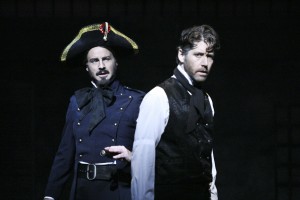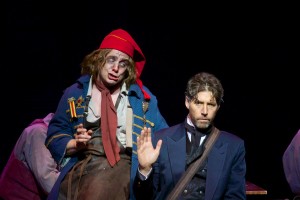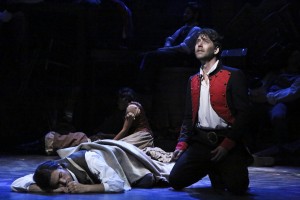DON’T MIZ IT
Unlike most of the characters in the blockbuster sung-through musical Les Misérables, the show itself will never die. Consistently presented either on Broadway, national tours, and/or globally since the English-language version opened on the West End in 1985, audiences can’t get enough of Victor Hugo’s story about ex-con and do-gooder Jean Valjean and his righteous long-arm-of-the-law pursuer, Javert. With a speedy 3-hour running time, the rousing anthems, heartbreaking ballads, delicious characters right out of Dickens, and compelling storytelling’”from Valjean’s paroling to the Paris Uprising of 1832’”prove that modern audiences and millennials do indeed have an attention span if the material is great.
With the movie adaptation complete and a sleek new production having safely found its audience on Broadway, the rights have been released to mid-size houses and regional theaters around the country. With dozens of roles, many of them major, and 30+ ensemble members, all of whom must sing spectacularly while negotiating hundreds of costume and wig changes, Les Miz is not an easy venture to undertake. While their production isn’t revolutionary, La Mirada Theatre and Mc Coy Rigby Entertainment capture the revolutionary spirit in their Los Angeles Regional Theatre Premiere.
With the turntable and multi-media spectacle of Broadway productions expunged, director Brian Kite and Casting Director Julia Flores have assembled the most important thing: singers. Some acted better than others, but the vocals blew me away, even with distracting sound issues such as popping and mikes dropping out (hopefully one day, designers will be brought in much sooner to eliminate sound snafus).
Broadway barihunk James Barbour anchors the show as Valjean, and while his vocal abilities were never in doubt, he positively stunned with a powerful and resonant tenor; his rendition of “Bring Him Home” was one of the most stirring on record. In the dozen times I have seen Les Miz, it’s the first that a lengthy and roaring ovation followed this poignant ballad. (Then again, the opening night audience got in the way of the vulnerable moments by clapping at the drop of a baguette’”at one point, a character held one of those long American Idol-like belt notes, and audience members yelled, “Yeah, Girl!” I wanted to scream, “You DO know she’s dying, right?!”)
Other characters were portrayed as well as those on Broadway. Michael Stone Forrest was the apotheosis of sanctity and strength as the Bishop who bestows silver candlesticks on Valjean as a way to keep him from a life of thievery. An impassioned and persuasive Anthony Federov brought life to Enjolras, the leader of the revolutionaries with no backstory whatsoever (indeed, I don’t believe the character’s name is even mentioned in the show). Jeff Skowron and Meeghan Holaway wisely don’t go over the top as Monsieur and Madame Thénardier, lowlifes who make Fagin from Oliver a candidate for Sainthood.
Valerie Rose Curiel veered from that yodeling, pop-opera sound as Thénardier’s daughter Éponine, offering a lovely, straightforward teenager who is torn between unrequited love and a life of larceny. A real find was Jude Mason as the Artful Dodger-like boy, Gavroche; it’s always thrilling to see a child actor powerful in voice who can eschew cloying behavior. And as Valjean’s adopted daughter Cosette, who falls for the student revolutionary Marius, Kimberly Hessler presented a clarity of tone that was astonishing.
Three leads fortunately did not get in the way of the show’s impact with undistinguished performances. Randall Dodge matched Barbour in booming voice and tall stature as Javert, but he lacked character complexity. Cassandra Murphy as the good-girl-turned-prostitute Fantine (“I Dreamed a Dream”) pushed way too hard as if she was scrunching three-hours of drama into her twenty-minute role; she went for tortured when damaged purity is called for. Nathaniel Irvin offered another golden voice as Marius, the student revolutionary who falls for Cosette, but dramatic intent went missing.
Credit for the vocals goes to Musical Director John Glaudini, who did wonders with a scaled-down 13-member orchestra. But the stars of the show are creators Claude-Michel Schönberg (music), Herbert Kretzmer (English language libretto based on original French lyrics by Alain Boublil and Jean-Marc Natel), and James Fenton (additional material). These gentlemen may have truncated and in some ways bastardized Hugo’s novel, but there must have been Divine Intervention because they found the beating heart of the universal human journey: the search for love in a world of injustice.
photos by Michael Lamont
Les Misérables
McCoy Rigby Entertainment
La Mirada Theatre for the Performing Arts
14900 La Mirada Boulevard in La Mirada
scheduled to end on June 22, 2014
for tickets, call 562.944.9801 or visit La Mirada










{ 2 comments… read them below or add one }
I’m seeing this tonight. Your article has me extra excited!
Show was decent for such a small theatre.